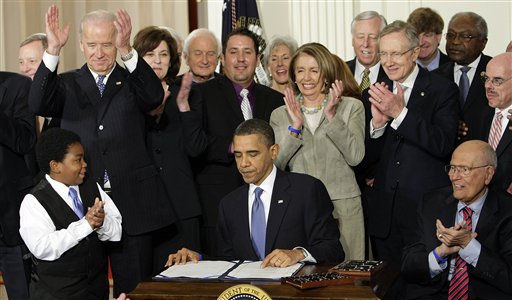The battle to pass the highly controversial health care bill ended this week in Washington, D.C. when President Obama signed the bill into law after a lengthy debate in the house.
The House passed the bill with a 219-212 without a single Republican vote after a handful of pro-life Democrats aligned with the “yes” side when Obama promised the funding couldn’t go toward abortions.
The bill’s proponents claim that the bill will both make health care more affordable and help cover the 32 million Americans who are uninsured. Some point out that the bill still leaves about 23 million uninsured by 2019. By 2014, the new system will prevent insurance companies from denying coverage to applicants with preexisting medical conditions. Six months from now, companies will be prohibited from excluding children with preexisting medical conditions.
“Tonight, at a time when the pundits said it was no longer possible, we rose above the weight of our politics,” Obama said in a news release after his victory. “We proved that this government —- a government of the people and by the people —- still works for the people.”
Emily Anderson, Biola Republican club president, said that while the bill’s passage was a victory for Obama, it was certainly not for the American people as a whole.
The bill will assist college students by allowing them to stay on their parents’ insurance until the age of 26 and expand Pell Grant awards from $2,600 to $6,000 by 2017.
However, there are consequences in the new law. If any citizen is without health insurance by 2014, the IRS will fine them $95, or one percent of his or her income. This cost increases to $695 or 2.5 percent of their income by 2016 if the citizen is still uninsured.
“I’m kind of surprised,” said sophomore Afua Asare. “I feel like with all the trash people were talking…it wasn’t going to pass.”
But it did. Freshman Gavin Kirkwood wasn’t entirely opposed to the idea of the government stepping into the issue of health care.
“Though I’m not sure if a bigger government is the answer, I cannot think of anyone else who could regulate the extremely profitable health care industry,” he said.
C. David Peters, a professor of political science and public administration, encouraged students to think about those who can’t afford care.
“I genuinely and sincerely believe that this nation should be able to guarantee a minimum level of health coverage for all citizens,” he said. “Just imagine if you didn’t have any health insurance at all.”
In 1854, a mental health bill was vetoed by President Franklin Pierce, who said it was unconstitutional for the government to be involved in private health matters. Ever since then, other presidential administrations have either advocated for or against similar plans. The health care overhaul of 2010 has overruled that long-past decision, now allowing the government the rights to oversee the handlings, and make the decision on patients’ end-of-life treatment, as pages 427 and 430 of the bill state.
The new set of health laws resurfaces the issue of abortion. Obama issued an executive order that is supposed to prohibit government subsidies from directly funding abortions. Some are still concerned, however, that his written word could soon be changed.
“That is a common concern with any politician…all you can do is listen and hold them accountable.”







